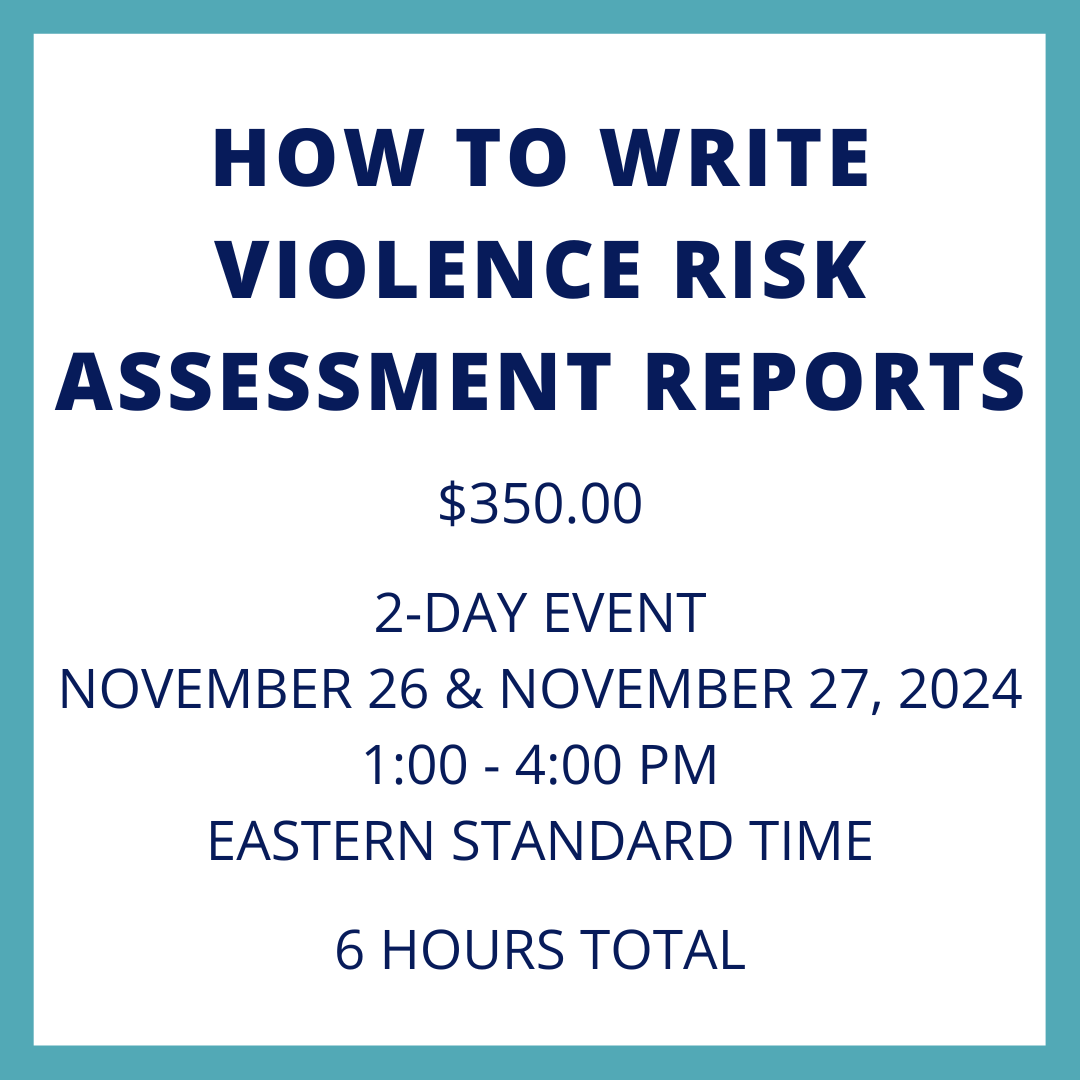How to Write Violence Risk Assessment Reports
Instructor Names:
Lisa Ramshaw, MD, DPhil, FRCPC
Treena Wilkie, MD, FRCPC
Instructor Email Addresses:
[email protected]
[email protected]
Date and Time:
Tuesday, November 26, 2024, 1:00pm – 4:00pm Eastern Time (3 hours)
Wednesday, November 27, 2024, 1:00pm – 4:00pm Eastern Time (3 hours)
Cost: $350 CAD
Discount for SAARNA Affiliates: $50 (See NOTE below.)
Discount for students: $150 (Please complete this form for approval as a student participant.)
(NOTE: You MUST log into your account to register and get the discount at checkout. If you are joining SAARNA for the discount, please register as an Affiliate or User and then wait until your SAARNA account is activated before registering for this event. You will receive one email with a receipt for your SAARNA Affiliate registration and then a 2nd email when your account is manually approved and activated. Please wait for this 2nd email before registering for this event.)
Description of Event:
Attend this event to improve your risk assessment reports. Violence risk assessment reports vary depending on the complexity of the case, the purpose of the report, and the expert. Nevertheless, there are certain best practices for all such assessments, and experts have an obligation to communicate in a fair, objective, and non-partisan way. This workshop will take place in two parts. The first half day will, using interactive activities, cover the fundamentals of risk assessment report writing. It will review the most common types of risk assessments for crime and violence: civil and criminal (for example, pre-sentence assessments, sex offender registry evaluations, and Dangerous Offender proceedings), sexual and non-sexual violence, as well as gender, youth, and sociocultural issues. It will also address the role of the expert, strategies to reduce bias and ensure a balanced practice, how to communicate with retaining parties, the assessment process, and report preparation. Different types of reports will be reviewed, which vary in format, length, and content related to risk assessment and risk management. The second half day will involve analysis of simple and complex risk assessment reports, with opportunities for self-assessment and peer-review.
Key resources for this event are the following:
Canadian Guidelines for Forensic Assessment and Report Writing: General Principles
https://www.capl-acpd.org/wp-content/uploads/2022/06/01-Guidelines-FIN-EN-Web.pdf
Violence Risk Assessment
https://www.capl-acpd.org/wp-content/uploads/2023/05/04-Violence-Risk-Assessment-Guidelines-EN-Web.pdf
Sexual Behaviours and Sex Offender Risk Assessment
https://www.capl-acpd.org/wp-content/uploads/2023/05/06-Sexual-Behaviour-and-Risk-of-Sexual-Offending-Guidelines-EN-Web.pdf
Dangerous Offender/Long-Term Offender Assessments
https://www.capl-acpd.org/wp-content/uploads/2023/05/05-Dangerous-Offender-Long-Term-Offender-Guidelines-EN-Web.pdf
Presenters:
Lisa Ramshaw, MD, DPhil, FRCPC, is a staff psychiatrist in the Forensic Service at the Centre for Addiction and Mental Health in Toronto, a Royal College of Physician Surgeons of Canada Founder in Forensic Psychiatry, and an Associate Professor in the Department of Psychiatry at the University of Toronto. She is the lead and co-author of the Canadian Forensic Psychiatry Assessment and Report Writing Guidelines.
Treena Wilkie, MD, FRCPC, is the Chief of the Forensic Service and the Associate Chief Medical Officer at the Centre for Addiction and Mental Health in Toronto. She is an Associate Professor in the Department of Psychiatry at the University of Toronto. She is a co-author of the Canadian Forensic Psychiatry Assessment and Report Writing Guidelines.
Prerequisites:
This workshop is likely to be of benefit to professionals familiar with the basics of risk assessments in corrections or forensic mental health. Both beginning and experienced evaluators will have the opportunity to improve their report writing skills through peer review and expert feedback. It would also be of value to attorneys engaged in high-stakes proceedings that hinge on the risk for violence.
Notes for Participants:
Training delivered via Zoom. Duration is 6 hours over 2 days.
Maximum number of seats: 25
Note: Registrants should sign up using the email address of the person ATTENDING the talk so they can receive important announcements (e.g., Zoom link, training materials).
Electronic versions of training materials will be made available 1-2 days prior to the start of the training.


